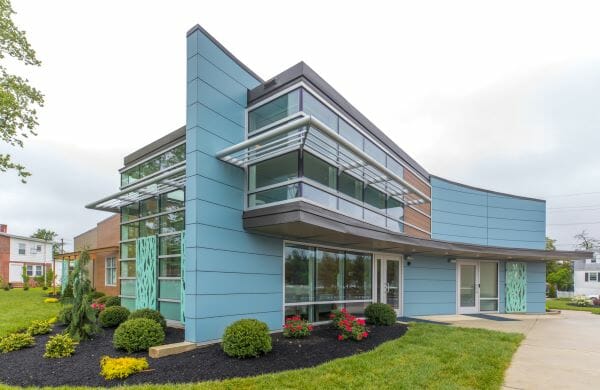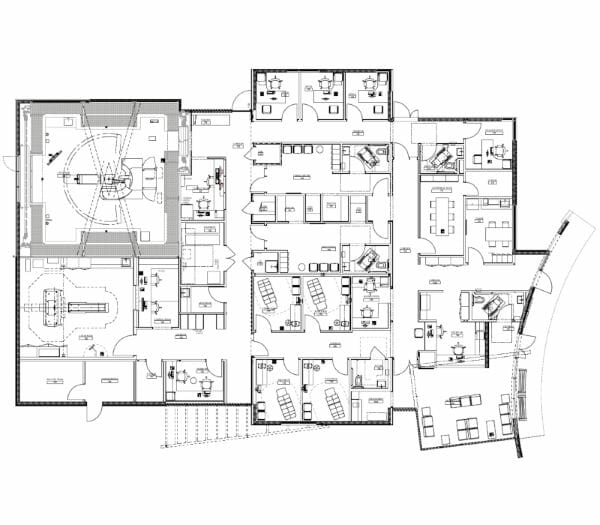Modular Construction to the Rescue!
The Inspira Oncology Center in Woodbury, NJ urgently needed to service cancer patients in the surrounding communities. The decision to develop a new type of facility comprised of modular technologies allowed for a faster construction to more quickly deliver medical treatments to those in need. It was determined early in the design process that the patients and their families’ health and comfort would take precedence. Considering the schedule and the speed at which the center would start providing services, the owners concluded the facility could be designed to reflect a higher level of design and construction quality.
The oncology center was comprised of various spaces common to most medical facilities such as offices, reception area, conference rooms, waiting rooms, exam rooms, lounge and supporting facilities. The center was given an open feeling by using a clerestory and entrance curtain wall to maximize natural lighting. Innovative and attractive facades were implemented around the exterior of the building to advance the buildings aesthetics. Unique art sculptures were commissioned and located around the facility amongst the beautiful landscaping surrounding the center.
Additionally, this center included a CT SIM Room to allow for quicker patient imaging at the center and a LINAC Room to conduct proton therapy where high energy x-rays or electrons are used to combat tumors and destroy cancer cells. Specialized control rooms adjoining the respective therapy spaces were incorporated in the construction.
Sustainable Modular Management Inc., with support from fabricator Southeast Modular Manufacturing, was able to work with Inspira Health Network Group to design, develop, and finally construct a highly technical, sophisticated, innovative and welcoming medical center in less than one year!
This article originally appeared in the Modular Advantage Magazine - Second Quarter 2019 released in May 2019.

Exterior of the Inspira Oncology Center / Source: Sustainable Modular Management Inc.

Floorplan of the Inspira Oncology Center / Source: Sustainable Modular Management Inc.
More from Modular Advantage
AoRa Development Aims for New York’s First Triple Net Zero Building Using Modular Methods
More cities are providing funding for newer infrastructure projects as long as they meet sustainability requirements. This is how modular can fit the bill, thanks to its lower waste production.
Developers and Designers: Lessons Learned with Modular Design
Modular construction is attractive to many developers because sitework and module construction can occur simultaneously, shortening the schedule and reducing additional costs.
UTILE: Putting Modular Building on a Fast Track
In Quebec, UTILE is taking the lead in creating affordable modular buildings to help decrease the student housing shortage. During the process, the company discovered what it takes to make the transition to modular building a success.
Sobha Modular Teaches Developers How to Think Like Manufacturers
With its 2.7 million square foot factory in UAE, Sobha Modular is bringing both its high-end bathroom pods to high-end residences to Dubai while developing modular projects for the U.S. and Australia.
RoadMasters: Why Early Transport Planning is Make-or-Break in Modular Construction
In modular construction, transportation is often called the “missing link.” While it rarely stops a project outright, poor planning can trigger costly delays, rerouting, and budget overruns.
Navigating Risk in Commercial Real Estate and Modular Construction: Insights from a 44-Year Industry Veteran
Modular projects involve manufacturing, transportation, and on-site assembly. Developers must understand exactly what they are responsible for versus what they subcontract. Risk advisors should research the developer’s contractors, subcontractors, and design-build consultants—especially the modular manufacturer.
Art²Park – A Creative Application of Modular and Conventional Construction
Art²Park is more than a park building—it’s a demonstration of what modular construction can achieve when thoughtfully integrated with traditional materials. The use of shipping containers provided not only speed and sustainability benefits but also a powerful structural core that simplified and strengthened the rest of the building.
Building Smarter: A New Standard in Modular Construction Efficiency
Rising material prices, labour shortages, expensive financing and tightening environmental rules have made conventional construction slower, costlier, and more unpredictable. To keep projects on schedule and within budget, builders are increasingly turning to smarter industrialized methods.
Resia: Breaking All the Rules
Resia Manufacturing, a division of U.S.-based Resia, is now offering prefabricated bathroom and kitchen components to industry partners. Its hybrid fabrication facility produces more precise bathroom and kitchen components (modules) faster and at lower cost than traditional construction. Here’s how Resia Manufacturing does it.
How LINQ Modular Innovates to Bring Modular To The Market in the UAE and Beyond
LINQ Modular, with an office and three manufacturing facilities in Dubai, is a modular firm based in United Arab Emirates. The company is on a mission: to break open the housing and construction markets in the Gulf Cooperation Council (GCC) area with modular.










